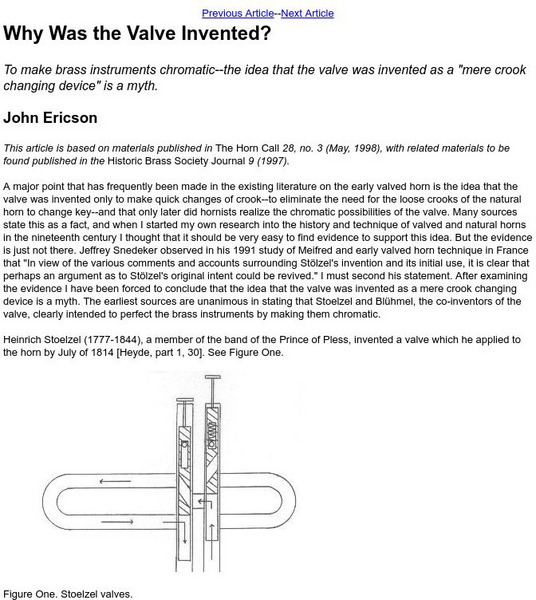Hi, what do you want to do?
Smithsonian Institution
The Birth of an Icon: Learning and Performing the Origins of the Drum Set and Early Jazz Drumming in New Orleans, Louisiana
Bass drum, snare drum, tom-toms, cymbals. Perched behind their drum sets, wielding their drum sticks and wire brushes, drummers lay the grove and are the heartbeat of a band's performance. A dynamic lesson introduces young musicians to...
Physics Classroom
Name That Harmonic: Closed-End air Columns
Physics is like music—practice makes perfect! Challenge your class using an interactive that builds harmonic skills. The engaging lesson from a playlist exploring sounds and waves revolves around wave behavior in closed-end air columns....
Classics for Kids
Instrumental Sounds
What sound does a piccolo make? What's the difference between a violin and viola? What family does a timpani belong to? Take a tour through the different sections of an orchestra with an interactive reference tool.
Classics for Kids
Fun With Musical Words
Is concertmaster another term for conductor, or is he or she another person entirely? Learn the specifics of the role of concertmaster with an activity focused on classical music. After learners define the term, they...
Classics for Kids
Listen to the Music
Different pieces of music can elicit different emotions from audience members. A quick tempo can make you feel happy, while a largo piece may bring out a melancholy temperament. Elementary musicians learn more about the instruments...
Classics for Kids
A Composer Leads the Way
What song is playing? A music activity focuses on composers throughout history, their famous works, and the instruments in each piece. As pupils complete the worksheet they play a short game to review music theory terms.
Classics for Kids
Instruments Have a Family
Are the instruments in Bach's Brandenburg Concerto No. 2 in the same family as those in George Gershwin's Rhapsody in Blue? Elementary musicians work on their music theory and their instrumental ear as they listen to clips of famous...
Curated OER
The Layout of an Orchestra
In this orchestra worksheet, 7th graders follow directions for coloring in a diagram of an orchestra setting. They shade each section according to the type of instrument that would be seated there.
Curated OER
The Brass Family
Students observe a PowerPoint presentation to explore how brass instruments produce wounds. They observe the teacher demonstrate the proper use of the mouthpiece and slides to produce a tone. With and without the mouthpiece, students...
Curated OER
Musical Instruments
In this musical instruments learning exercise, students identify and locate 20 various types of musical instruments in a word search. First, they locate brass and percussion instruments. Then, students locate string and woodwind...
Curated OER
Instrument families
Students brainstorm to list as many instruments as they can and try to guess which instrument family into which they fit. They research each instrument on a website and find the family, hear the sound and learn about each one.
Curated OER
Music - Lesson 3 - Orchestra
Second graders study the four families of orchestral instruments and patriotic songs in this unit of lessons.
Arizona State University
Arizona State University: Why Was the Valve Invented?
Dr. Ericson holds firm to his beliefs that the valve was not invented as "a mere crook changing device." Dr. Ericson embraces the idea that the "co-inventors of the valve clearly intended to perfect the brass instruments by making them...
Arizona State University
Arizona State University: What Was the Omnitonic Horn?
This Arizona State article suggests that the omnitonic horn and valved horns were invented in the same era and for the same reasons. However, further reading points out the differences between the two. The explanation for their invention...
John F. Kennedy Center
The Kennedy Center: Brass Instruments and Pitch
Students will enjoy making their own brass instrument with this interesting lesson plan. Objectives include what factors affect the pitch of brass instruments and what determines pitch.
The Orchestra
The Orchestra: A User's Manual Horns
A wonderful resource covering many aspects of the French horn. Most explanations are made with video and audio clips of members of the Philharmonia Orchestra. Be sure to check out the players tips and tricks section.
The Orchestra
The Orchestra: A User's Manual Trumpets
An excellent resource covering many aspects of the trumpet. Most explanations are made with video and audio clips of members of the Philharmonia Orchestra. Be sure to check out the players tips and tricks section.
The Orchestra
The Orchestra: A User's Manual Trombones
A valuable resource covering many aspects of the trombone. Most explanations are made with video and audio clips of members of the Philharmonia Orchestra. Be sure to check out the players tips and tricks section.
The Orchestra
The Orchestra: A User's Manual Tubas
A terrific resource covering many aspects of the tuba. Most explanations are made with video and audio clips of members of the Philharmonia Orchestra. Be sure to check out the players tips and tricks section.
The Orchestra
The Orchestra: A User's Manual Brass Ranges
Learn the ranges of all of the brass instruments. The chart shows the written pitch and the sounding pitch. There are also comments about some of the instruments ranges.
Other
History of Taps
Many questions are answered concerning the history of Taps at this site. A wealth of information covers everything from the origins of Taps to performance guidelines.
Quia
Quia: Truth Is Stranger Than Fiction "Musical Hangman"
Test your knowledge of instruments of the orchestra with this interactive hangman game. Click on letters to guess the mystery word!
Other
The Brass Crest Cornet
Ignore the ads and find excellent info on the cornet. Provides a physical description, tone, its role in the brass band, cornet vs. trumpet, and the soprano cornet.
Dallas Symphony Orchestra
Dallas Symphony Orchestra Kids: Orchestra Seating Chart: Baroque, Classical, Romantic
See how the number of orchestra members increased from the Baroque period through the Classical, up to the Romantic. You can print each orchestra seating chart.























